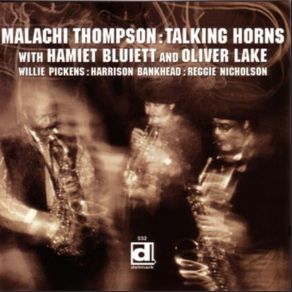Talking Horns
Download links and information about Talking Horns by Malachi Thompson. This album was released in 2001 and it belongs to Jazz genres. It contains 8 tracks with total duration of 01:03:35 minutes.

|
|
|---|---|
| Artist: | Malachi Thompson |
| Release date: | 2001 |
| Genre: | Jazz |
| Tracks: | 8 |
| Duration: | 01:03:35 |
| Buy it NOW at: | |
| Buy on iTunes $9.99 | |
Tracks
[Edit]| No. | Title | Length |
|---|---|---|
| 1. | Woody's Dream | 6:28 |
| 2. | Brass and Oak | 7:48 |
| 3. | Scope | 4:48 |
| 4. | Way Back When We Didn't Understand | 5:14 |
| 5. | Fred Hopkins | 8:46 |
| 6. | Talking Horns | 8:08 |
| 7. | Lucky Seven | 11:42 |
| 8. | Circles In the Air | 10:41 |
Details
[Edit]Malachi Thompson has little patience with dogmatists who claim that a jazz musician has to live in New York to be legitimate. The veteran trumpeter has been around the Chicago jazz scene all his life, and he knows darn well that there are many accomplished Midwestern improvisers who don't have a Manhattan address. In the liner notes that he wrote for Talking Horns, Thompson spends a lot of time discussing the Chicago/St. Louis connection in jazz — a connection that Delmark founder Bob Koester is well aware of because he started the label in St. Louis before moving it to Chicago. Both are Midwestern cities that have made important contributions to jazz, and this 1999 session finds Thompson acknowledging the cities by leading a sextet that consists of four Chicagoans (Thompson, pianist Willie Pickens, bassist Harrison Bankhead, and drummer Reggie Nicholson) and two St. Louis natives (alto saxman Oliver Lake and baritone saxman Hamiet Bluiett). Together, the improvisers favor an inside/outside approach and divide their time between hard swinging post-bop and more abstract, AACM-minded avant-garde jazz. "Circles in the Air" and the African-influenced title track are among the CDs more left-of-center offerings, while "Brass and Oak," "Way Back When We Didn't Understand," and the McCoy Tyner-ish "Lucky Seven" are hard swinging post-bop items that are more inside than outside. Thompson, true to form, insists on keeping his options open — the trumpeter sees no reason why he cannot be influenced by Freddie Hubbard one minute and Lester Bowie the next. As a result, Talking Horns is unpredictable — you never know from one track to the next if the sextet will go in a straight-ahead post-bop direction or an AACM-influenced avant-garde direction. But whatever direction the sextet chooses, this album is consistently strong and serves as a fine example of Midwestern acoustic jazz.